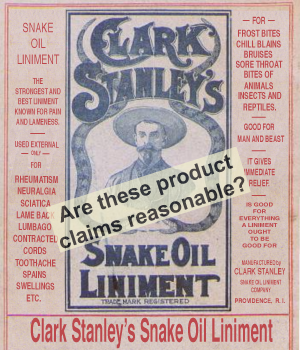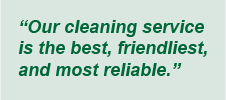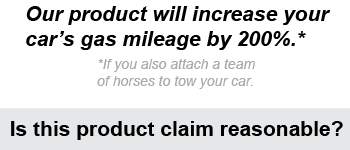|
Have you ever heard claims about a product that will mop up any spill, reverse any dent in a car, or otherwise change your life? Whether or not you go into science or technology for a career, it is important for you to know how to evaluate product claims—to separate the reasonable claims from the far-fetched ones. If it sounds too good to be true, then it probably isn’t true! 
|
 An important step in evaluating the labeling of products or services is to infer whether their claims are reasonable according to the science you know. Reasonable claims must
An important step in evaluating the labeling of products or services is to infer whether their claims are reasonable according to the science you know. Reasonable claims must - be specific, observable, and testable, such as “reduces swelling up to 60%”;
- be supported by objective evidence from a reputable source, such as doctors, the FDA, the EPA, or independent lab tests;
- be consistent with the laws of science, such as conservation of energy; and
- not make unsupportable statements—such as “the ultimate.”
Have students in your class bring in toothpaste boxes. Each student verbally states the product’s scientific claims from the packaging and then leads the class in discussing whether the claims satisfy the requirements above. Are the claims reasonable? 
|
Late night television ads often feature “real people” saying why they like the product. Their stories are examples of anecdotal evidence and are generally not scientific because they have not followed standards of testing, analysis, and independent review. Anecdotal evidence may be true, but empirical evidence is far more reliable and harder to falsify. 
|
One company recently claimed that their fuel cell product could create a substantial increase in gas mileage for cars. The U.S. Federal Trade Commission, however, examined the company’s promotional claims and inferred that the product would violate conservation of energy—it would create energy for “free,” out of nothing! The FTC pointed out that there was no scientific evidence supporting the promotional claims, and the company agreed to stop selling its product as an energy source. 
 |
Another company made similar claims recently—that they could create energy for free using a device with a rotor and various magnets. An independent panel collected and analyzed data, which debunked the company's claims. Independent reviews are one effective tool for evaluating claims about the efficacy of a product or service. An independent review is also useful to avoid bias in reporting evidence because reviewers should have no direct personal or financial interest in the product or service. 
|
 Marketing or promotional claims about services should be judged by the same criteria as for products. A cleaning service claiming to be the “best, friendliest, and most reliable” should offer evidence to support the claim. For example, the company could state that an independent organization found that its cleaners had a 100% on-time arrival rate and offered the same cleaning services for the lowest price in town. These statements are empirical, testable, and objective.
Marketing or promotional claims about services should be judged by the same criteria as for products. A cleaning service claiming to be the “best, friendliest, and most reliable” should offer evidence to support the claim. For example, the company could state that an independent organization found that its cleaners had a 100% on-time arrival rate and offered the same cleaning services for the lowest price in town. These statements are empirical, testable, and objective. 
|
 Sometimes an advertisement will “bury” relevant information about its product, hoping consumers won’t bother to read the “fine print.” Critique this product claim (at right): Is it reasonable? Why or why not?
Sometimes an advertisement will “bury” relevant information about its product, hoping consumers won’t bother to read the “fine print.” Critique this product claim (at right): Is it reasonable? Why or why not? 
|
| |
|

